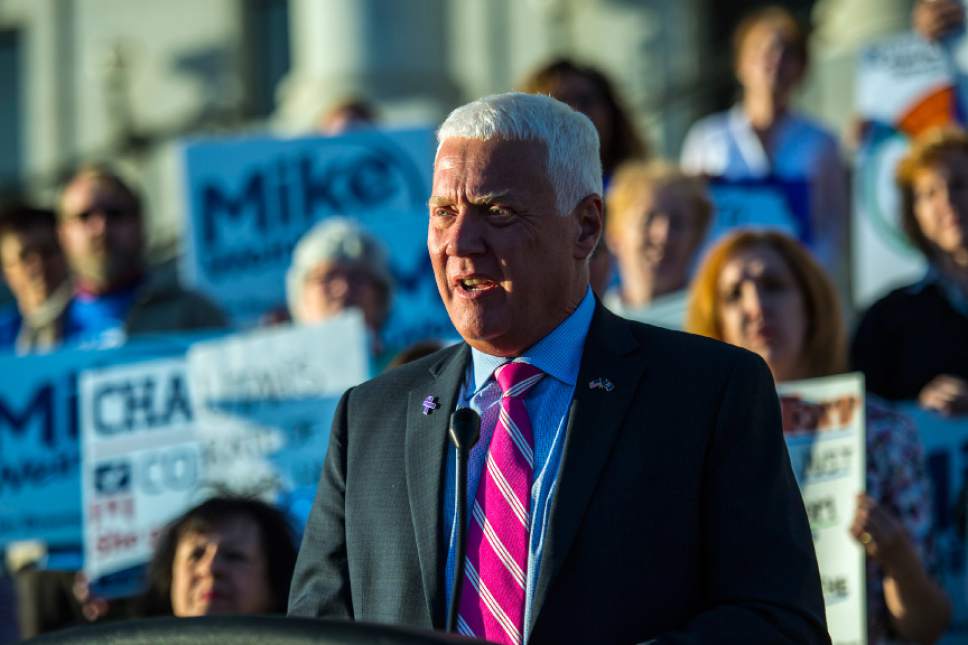This is an archived article that was published on sltrib.com in 2016, and information in the article may be outdated. It is provided only for personal research purposes and may not be reprinted.
Democratic gubernatorial candidate Mike Weinholtz blasted Gov. Gary Herbert Friday, accusing the governor of paying women in his office less than men doing the same jobs — a charge that the governor's campaign says is unfounded and politically motivated.
Weinholtz said his campaign did an analysis of public salary information and found, for example, that a male program director in the Governor's Office of Economic Development (GOED) earns $147,000, but a woman with the same title gets paid $10,000 less.
A program specialist in the office is paid $73,000, while his female counterpart is paid $60,000. And even female interns are paid 25 percent less than male interns, Weinholtz said.
"What kind of message does this send? What does it tell the women of Utah that our governor pays women significantly less for the same work done by a man? What does it tell a high school-age girl about her self-worth?" Weinholtz said during a news conference. "This is unacceptable. The governor's failure to identify or rectify this problem in his very own office is ultimate evidence of his lack of understanding or commitment to address women's issues in Utah."
Herbert's campaign manager, Marty Carpenter, said Weinholtz appears to be twisting the facts and pay equity and equal opportunity for men and women has been an important consideration for the governor.
"I don't think the numbers he uses for his side stand up to scrutiny," said Carpenter.
The Tribune was unable to independently verify Weinholtz's claims, since the data are complicated and could be skewed by staffers who in some cases didn't work for a full year or had a job title change mid-year, causing variations in the annual salary that was reported.
Both sides agree that the majority of Herbert's staff — both directly in the governor's office and in ancillary offices like GOED and the Governors Office of Management and Budget — are women.
Weinholtz said the disparity is symptomatic of a larger problem in Utah. According to a report entitled Status of Women in The States, Utah ranks 39th in terms of employment and earnings for women and female workers make just 70 percent as much as their male counterparts. The report gave Utah a D grade.
"This is unacceptable and embarrassing," Weinholtz said. "There are women in Utah with brilliant minds, incomparable work ethic, and strong leadership skills. It benefits no one to limit them or hold them back for no good reason, and yet that's exactly what happens in our state. This is exactly what the governor allows to happen."
Carpenter said wage disparity is an issue Herbert is aware of and "Certainly the governor is doing his part by trying to lead by example." He said that the governor has also emphasized the need for educational opportunities for everyone as a way to level the playing field when it comes to salaries.
"There clearly is and has been a persistent wage gap and there's a whole constellation of factors that lead to this outcome," said Pam Perlich, director of demographic research at the University of Utah's Kem C. Gardner Policy Institute.
Part of it is "occupational segregation" where women are steered into fields that pay less. That is often driven by cultural issues and socialization, Perlich said. In Utah there is also a trend of women starting college, but not completing it, which limits the opportunities available.
Women fare better in comparison to men early in their careers, Perlich said, but lose ground if they take time off to have children. Returning to the workplace can be challenging and opportunities can be limited if the employers don't offer paid time off, child-care options or flexible schedules that accommodate rearing a family.
"We live in a culture that values having children and we see the mark of that in this [wage] data and I think we see the mark of that in the outcomes for women as they're having to take lower-paying jobs that do have flexible working hours," Perlich said. "They're taking a huge hit in wages."
Having employers that offer flexible work schedules and paid parental leave could go a long way to alleviating wage inequity in the workplace, she said.
Twitter: @RobertGehrke



